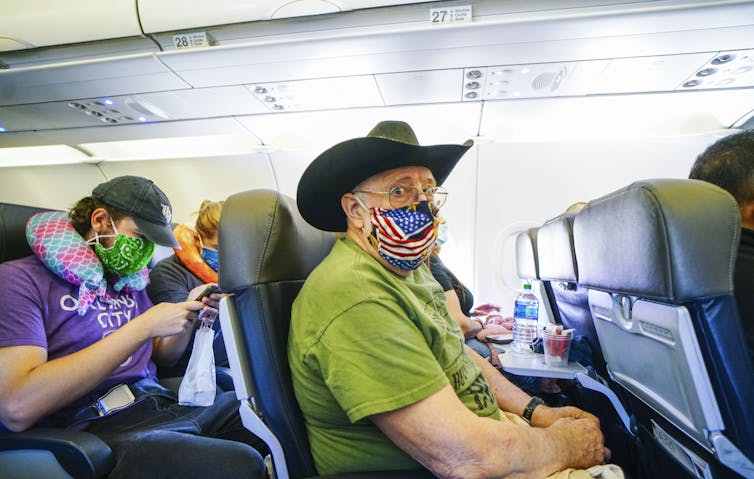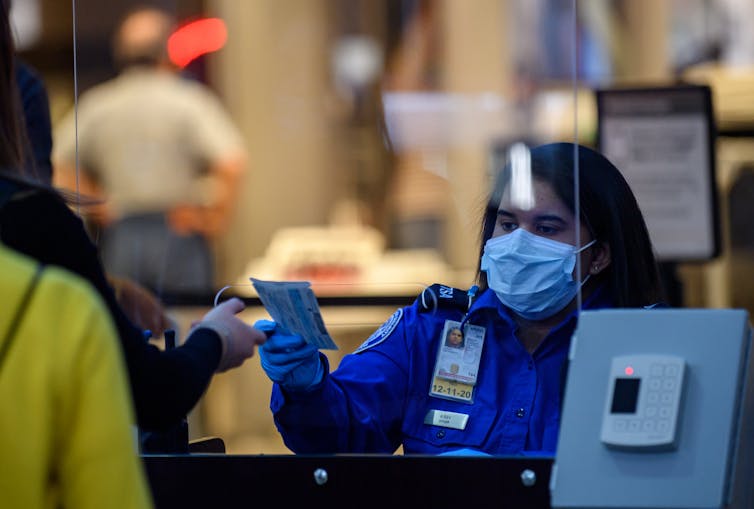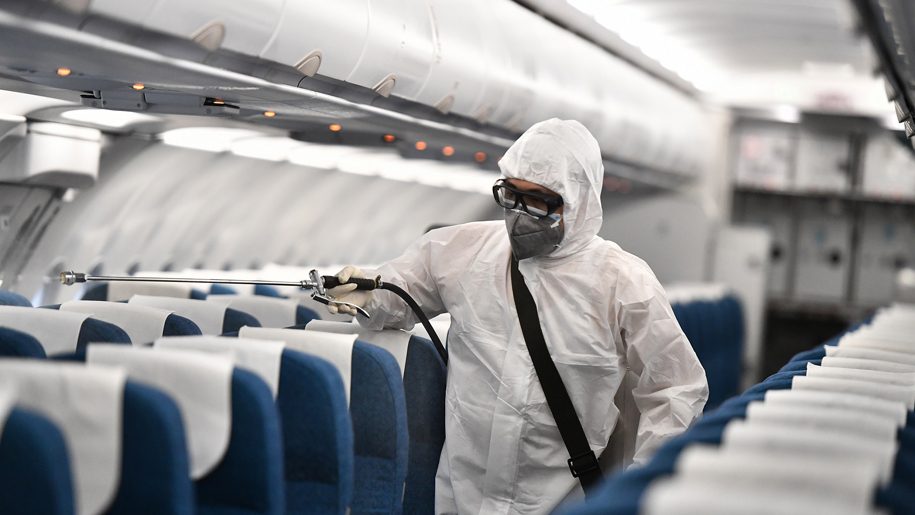We don’t know about you, but we’re ready to travel. And that typically means flying.
We have been thinking through this issue as moms and as an exposure scientist and infectious disease epidemiologist. While we’ve decided personally that we’re not going to fly right now, we will walk you through our thought process on what to consider and how to minimize your risks.

Why the fear of flying?
The primary concern with flying – or traveling by bus or train – is sitting within six feet of an infected person. Remember: Even asymptomatic people can transmit. Your risk of infection directly corresponds to your dose of exposure, which is determined by your duration of time exposed and the amount of virus-contaminated droplets in the air.
A secondary concern is contact with contaminated surfaces. When an infected person contaminates a shared armrest, airport restroom handle, seat tray or other item, the virus can survive for hours though it degrades over time. If you touch that surface and then touch your mouth or nose, you put yourself at risk of infection.
Before you book, think
While there is no way to make air travel 100% safe, there are ways to make it safer. It’s important to think through the particulars for each trip.
One approach to your decision-making is to use what occupational health experts call the hierarchy of controls. This approach does two things. It focuses on strategies to control exposures close to the source. Second, it minimizes how much you have to rely on individual human behavior to control exposure. It’s important to remember you may be infectious and everyone around you may also be infectious.
The best way to control exposure is to eliminate the hazard. Since we cannot eliminate the new coronavirus, ask yourself if you can eliminate the trip. Think extra hard if you are older or have preexisting conditions, or if you are going to visit someone in that position.
If you are healthy and those you visit are healthy, think about ways to substitute the hazard. Is it possible to drive? This would allow you to have more control over minimizing your exposures, particularly if the distance is less than a day of travel.
You’re going, now what?
If you choose to fly, check out airlines’ policies on seating and boarding. Some are minimizing capacity and spacing passengers by not using middle seats and having empty rows. Others are boarding from the back of the plane. Some that were criticized for filling their planes to capacity have announced plans to allow customers to cancel their flights if the flight goes over 70% passenger seating capacity.
Federal and state guidance is changing constantly, so make sure you look up the most recent guidance from government agencies and the airlines and airport you are using for additional advice, and current policies or restrictions.
While this may sound counterintuitive, consider booking multiple, shorter flights. This will decrease the likelihood of having to use the lavatory and the duration of exposure to an infectious person on the plane.
After you book, select a window seat if possible. If you consider the six-foot radius circle around you, having a wall on one side would directly reduce the number of people you are exposed to during the flight in half, not to mention all the people going up and down the aisle.
Also, check out your airline to see their engineering controls that are designed or put into practice to isolate hazards. These include ventilation systems, on-board barriers and electrostatic disinfectant sprays on flights.
When the ventilation system on planes is operating, planes have a very high ratio of outside fresh air to recirculated air – about 10 times higher than most commercial buildings. Plus, most planes’ ventilation systems have HEPA filters. These are at least 99.9% effective at removing particles that are 0.3 microns in diameter and more efficient at removing both smaller and larger particles.

How to be safe from shuttle to seat
From checking in, to going through security to boarding, you will be touching many surfaces. To minimize risk:
- Bring hand wipes to disinfect surfaces such as your seat belt and your personal belongings, like your passport. If you cannot find hand wipes, bring a small washcloth soaked in a bleach solution in a zip bag. This would probably freak TSA out less than your personal spray bottle, and viruses are not likely to grow on a cloth with a bleach solution. But remember: More bleach is not better and can be unsafe. You only need one tablespoon in four cups of water to be effective.
- Bring plastic zip bags for personal items that others may handle, such as your ID. Bring extra bags so you can put these things in a new bag after you get the chance to disinfect them.
- Wash your hands or use hand sanitizer as often as you can. While soap and water is most effective, hand sanitizer is helpful after you wash to get any parts you may have missed.
- Once you get to your window seat, stay put.
- Wear a mask. If you already have an N95 respirator, consider using it but others can also provide protection. We do not recommend purchasing N95 until health care workers have an adequate supply. Technically, it should also be tested to make sure you have a good fit. We do not recommend the use of gloves, as that can lead to a false sense of security and has been associated with reduced hand hygiene practices.
If you are thinking about flying with kids, there are special considerations. Getting a young child to adhere to wearing a mask and maintaining good hygiene behaviors at home is hard enough; it may be impossible to do so when flying. Children under 2 should not wear a mask.
Each day, we are all constantly faced with decisions about our own personal comfort with risk. Arming yourself with specific knowledge about your airport and airline, and maximizing your use of protective measures that you have control over, can reduce your risk. A good analogy might be that every time you get in the car to drive somewhere there is risk of an accident, but there is a big difference between driving the speed limit with your seat belt on and driving blindfolded, 60 miles an hour through the middle of town.
![]()
Kacey Ernst, Associate Professor of Epidemiology and Biostatistics, University of Arizona and Paloma Beamer, Associate Professor of Environmental Health Sciences, University of Arizona
This article is republished from The Conversation under a Creative Commons license. Read the original article.










